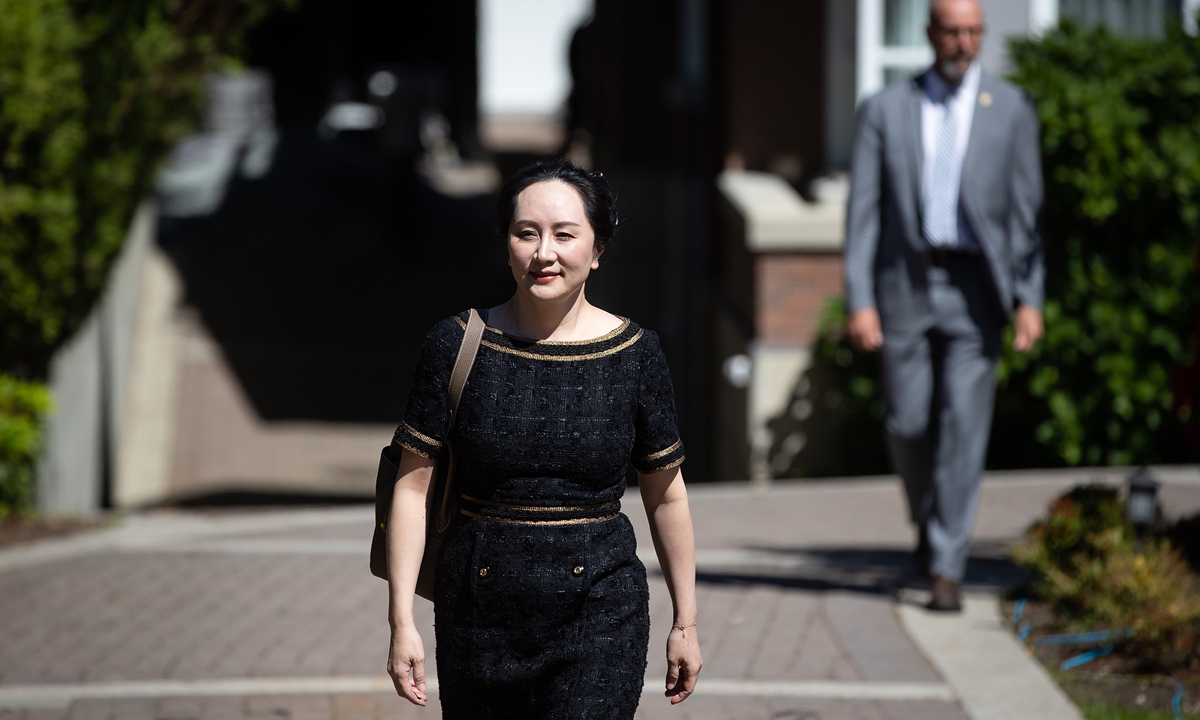Meng’s lawyers request Canadian court to release secretly-kept information
By GT staff reporters Source: Global Times Published: 2020/8/18 17:18:41

Meng wanzhou
Lawyers for Meng Wanzhou, chief financial officer of Huawei Technologies, is asking the B.C. Supreme Court to order the release of more secretly-kept information related to her arrest at Vancouver airport in 2018 - which observers said that would be key for Meng's extradition case and decisive whether she could be set free.
In documents filed with the court on Monday, the defense team argued that Meng "reasonably believes that many documents are the subject of excessive redactions and overly broad claims of privilege. It is likely that there is redacted information that is relevant to her abuse of process allegations," according to media reports.
Meng's defense team is now targeting at the alleged abuse of process — one of major controversial points in the extradition case.
Some observers who closely follow the case said Huawei is making efforts to challenge Meng's extradition, based on the fact that the US and Canadian authorities seriously violated Meng's rights. The B.C. court may deem that a legitimate process for handling the case could not be ensured so the case has to be stopped.
"Why can't the Canadian government produce the relevant evidence and documents? What ulterior motives are there between them (Canada) and the US government?" Chinese Foreign Ministry spokesperson Zhao Lijian said during a press conference in Beijing on Tuesday.
"China's position on Meng case is consistent and clear - what I want to emphasize is that the Chinese government is unwavering in our determination to safeguard the legitimate rights and interests of its nationals and its enterprises", Zhao said, adding that China supports relevant enterprises and individuals in taking up legal weapons to safeguard their legitimate rights.
A number of evidences obtained by the Global Times in 2019 showed that the arrest of Meng was a politically driven trap colluded by the US Federal Bureau of Investigation (FBI), the Royal Canadian Mounted Police (RCMP) and Canada Border Services Agency (CBSA) that included abuse of law enforcement procedure and violations of law.
Meng's lawyers claim US and Canadian authorities conspired to violate her rights at the time of her arrest by having the CBSA detain and question her without a lawyer at present and seize her electronic devices, the Canadian Broadcasting Corp reported on Monday. And at an earlier hearing, they said the RCMP shared technical details about those devices with the FBI in breach of Canada's Extradition Act.
Huawei has been preparing for a long battle in challenging extradition of its chief financial officer, who is also the daughter of Huawei founder Ren Zhengfei.
In addition to focusing on abuse of process, Meng's lawyers also provided new documents in June showing that US authorities made misstatements and omissions about a key presentation Meng delivered to HSBC, which further proves that Meng's case is a purely political maneuver designed by the US government to hamstring Huawei, according to observers.
In May, a Canadian court ruled that the extradition case against Meng can proceed, and the case meets the Canadian extradition standard of so-called "double criminality".
That court ruling made bilateral relations "worse than ever," He Weiwen, a former senior trade official and an executive council member of the China Society for World Trade Organization Studies, told the Global Times.
There's sufficient evidence that the US and Canada are abusing their bilateral extradition treaty in Meng Wanzhou's case, and they are severely violating a Chinese resident's legitimate rights by randomly imposing law enforcement measures on her, Zhao Lijian, the official from the Foreign Ministry said.
"It's a serious political event," Zhao said, adding that the US' purpose is to crack down on Huawei and Chinese high-tech companies, while Canada is an accomplice of the US in the case.
Posted in: ECONOMY,BIZ FOCUS